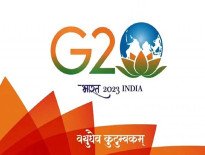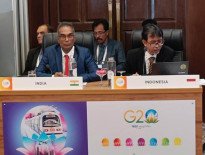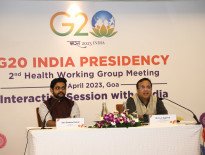Share
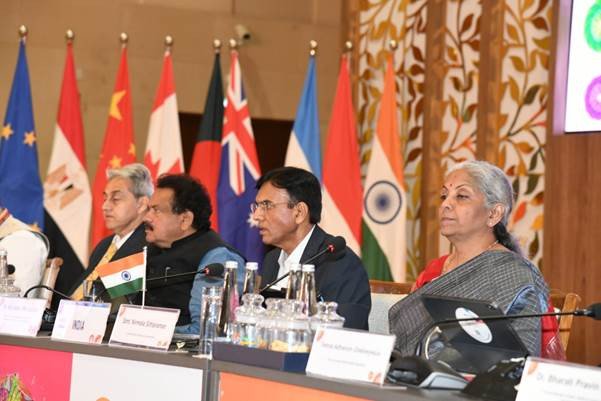
G20 Health Minister’s Meeting concludes in Gandhinagar, Gujarat
Global Initiative on Digital Health launched at the G2O Health Minister’s Meeting
1st Joint Finance and Health Ministerial under the Indian G20 Presidency chaired by Ms. Nirmala Sitharaman, and Dr. Mansukh Mandaviya
We as G20 countries need to work towards strengthening global collaboration to ensure accessibility and availability of equitable medical countermeasures particularly focusing on LMICs and LICs: Dr. Mansukh Mandaviya
“Climate Change is the biggest threat that humanity is currently facing”
“It is vital to share expertise, resources, and strategies, to address global health challenges effectively”
As G20 members it is our collective responsibility to create a “minimum viable product”, by leveraging the lowest common denominator: Dr. Mandaviya
The Joint Task Force under Indian Presidency has adopted a multi-year work plan for the first time and has also invited selected key regional organizations, thereby enhancing the voice of low-income countries: Ms. Nirmala Sitharaman
We are stronger when we work together: Dr. Tedros Adhanom Ghebreyesus, Director General, World Health Organization
In line with Prime Minister Shri Narendra Modi’s vision of an inclusive, ambitious, and action oriented G20 Presidency, the G20 Health Minister’s Meeting concluded with the adoption of an Outcome Document, as well as the launch of the Global Initiative of Digital Health which aims to consolidate and amplify recent and past gains in global digital health for health systems while strengthening mutual accountability to enhance the impact of future investments in healthcare.
As the G20 Health Minister’s Meeting drew to a close in Gandhinagar, Gujarat today, Dr. Mansukh Mandaviya, Union Minister for Health and Family Welfare said “Let us continue working together, fostering collaborations, and leveraging the potential of digital health, research, and innovation to ensure equitable access to quality healthcare for all. We must continue to ensure multilateral cooperation and, nurture partnerships in the field of health. It is vital to share expertise, resources, and strategies, to address global health challenges effectively.” He was joined by Dr Tedros Adhanom Ghebreyesus, Director General, World Health Organization (WHO), Union Ministers of State for Health and Family Welfare Dr. Bharati Pravin Pawar, and Prof S.P. Singh Baghel.
The second day of the Health Minister’s Meeting saw sessions on India’s two G20 Health Priorities- Strengthening Cooperation in Pharmaceutical Sector with focus on Availability & Access to Safe, Effective, Quality and Affordable Medical Countermeasures- Vaccine, Therapeutics & Diagnostics, and Digital Health Innovation & Solutions to aid Universal Health Coverage & Improve Healthcare Service Delivery. The last day of the G20 Health Minister’s Meeting also saw the 1st Joint Finance and Health Ministerial under the Indian Presidency.
Dr. Mandaviya while speaking about medical countermeasures said, “We as G20 countries need to work towards strengthening global collaboration to ensure accessibility and availability of equitable medical countermeasures particularly focusing on LMICs and LICs.”
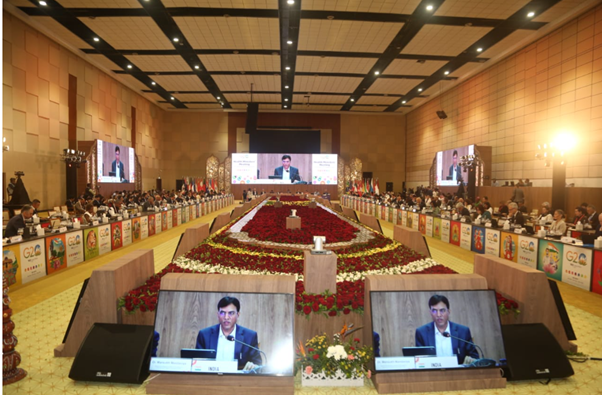
Underlining the importance of global collaboration and partnerships, the Union Health Minister stated “As G20 members it is our collective responsibility to create a “minimum viable product” by leveraging the lowest common denominator.” He further added “India’s G20 presidency prioritised this agenda in alignment with other forums including G7, WHO, and Johannesburg processes to create a Global medical countermeasure coordination mechanism adopting a “Network of Networks” approach.”
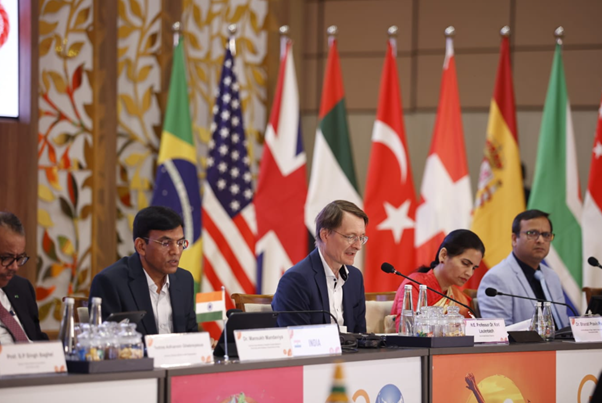
Dr. Mandaviya reiterated, “The Covid-19 pandemic has highlighted that the world needs a coordinated strategy to manage any health emergency, and to facilitate accessibility and availability of equitable medical countermeasures, specifically to those in need in an equitable manner.” He further stated “The effects of Climate Change is the biggest threat that humanity is currently facing and it is having an immense impact on health systems. I’m heartened to learn that the Asian Development Bank will be establishing the Climate and Health Initiative to work on mitigating this impact as well as building climate resilience within global health system architecture.”
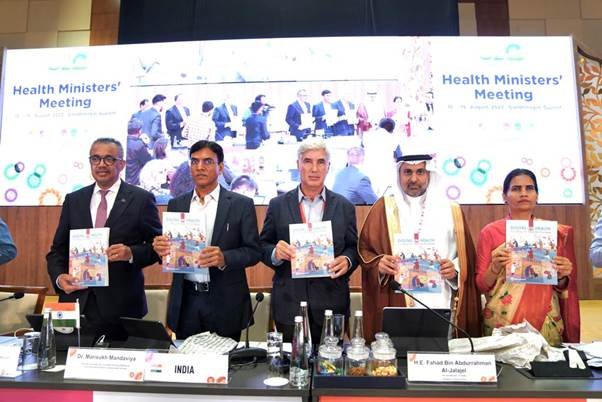
Dr Ghebreyesus, stated that vaccines, treatments and other products, play a central role in combating the Covid-19 pandemic. He emphasized that it is imperative to bridge the existing gaps, hence there is a need of a mechanism that enables accessibility to life-saving tools and stated “We are stronger when we work together.”
During the second session of the day, a World Bank Report titled Digital-in-Health: Unlocking the Value for Everyone, was launched. It presents a new way of thinking from simple digitization of health data to fully integrating digital technology in health systems. It focuses on infusing digital technologies in health financing, service delivery, diagnostics, medical education, pandemic preparedness, climate and health efforts, nutrition, and aging.
The first Joint Finance and Health Ministerial was chaired by Ms. Nirmala Sitharaman, the Union Finance Minister, and Dr. Mansukh Mandaviya. In the course of discussions in the Meeting, the Finance and Health Ministers expressed their commitment to continue strengthening the global health architecture for pandemic prevention, preparedness and response (PPR) through enhanced collaboration between Finance and Health Ministries under the Joint Finance and Health Task Force (JFHTF). At the Task Force meeting, Dr. Mandaviya announced the First Call for proposals by the Pandemic Fund. He further said, “It’s worth noting that more than 75% of the projects, that will receive support from this initial Call are located within LICs/LMICs Countries. He further acknowledged the need for Day Zero Financing as a crucial lesson for future health crises. In this regard, he said, “There is a need to converge the ongoing efforts to build a mechanism, to address this issue in G20 and G7 along with WHO & World Bank. Sustaining this collaboration beyond the emergency phase and exploring various coordination arrangements will aid G20 countries and the wider international community in developing critical strategies and approaches, for finance and health institutional coordination.”
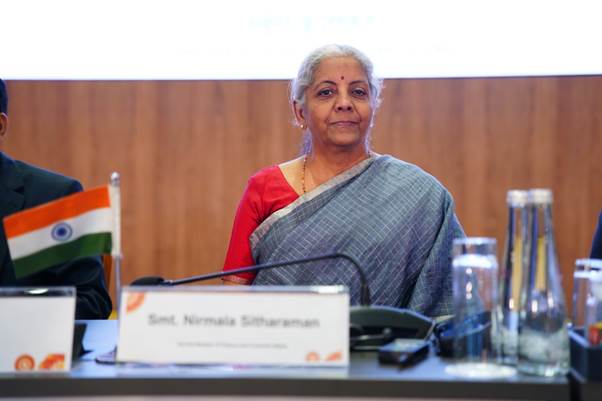
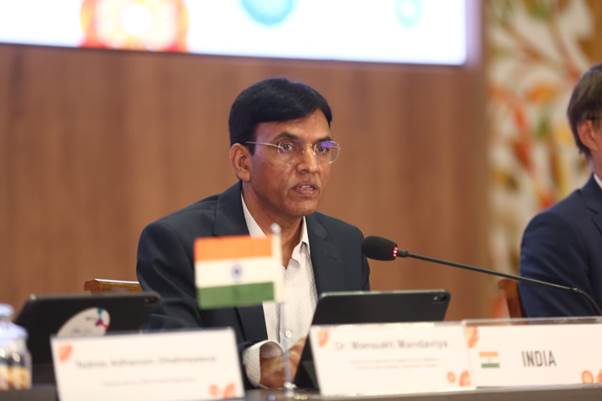
At the meeting Ms. Nirmala Sitharaman said “The Task Force under Indian Presidency has adopted a multi-year work plan for the first time and has also invited selected key regional organizations, thereby enhancing the voice of low-income countries.” The Ministers welcomed the outputs delivered by the JFHTF during the course of the Indian Presidency which include the following:
The Framework for Economic Vulnerabilities and Risks (FEVR) created through collaboration between World Health Organization, World Bank, IMF, and European Investment Bank.
The Report on Mapping Pandemic Response Financing Options and Gaps developed by the WHO and the World Bank.
The Report on Best Practices on Finance Health Institutional Arrangements during Covid-19.
Shri VK Paul (Member) Health, NITI Aayog, Shri Sudhansh Pant, Secretary, Ministry of Health and Family Welfare, Shri Rajeev Bahl, Director General, Indian Council of Medical Research, Shri Lav Aggarwal, Additional Secretary, Ministry of Health and Family Welfare, and other senior officials from the Ministry of Health and Family Welfare participated in the event. Health Ministers and delegates of the G20 member countries and invitee countries, as well as representatives of various international organization also joined the meeting.
Source : https://pib.gov.in/PressReleasePage.aspx?PRID=1950465
Related Posts
SEARCH SMECONNECT-DESK
RECENT POST
- Empower MSMEs & manufacturers to accomplish the vision of Hon’ble Prime Minister to make ‘Viksit Bharat’
- RAJASTHAN INDUSTRIES AND SME SUMMIT – JAIPUR
- PRIDE OF RAJASTHAN AWARDS
- Pack.Nxt 2025 Concludes with Actionable Conversations Shaping the Future of Packaging
- INTERACTIVE MEETING WITH CHAIRMAN, IRDAI


